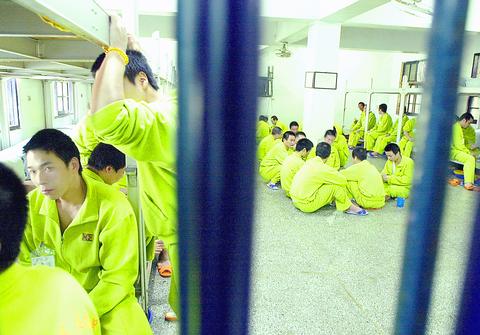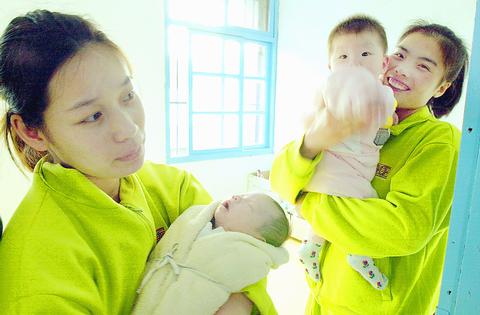Li Guangyun (李光云), a 21-year-old man from China, was arrested by customs officers at CKS Int-ernational Airport in September 1999 when he tried to use a fake passport to enter Taiwan.
For his crime, he was sentenced to seven months in jail for forgery, but by the time the verdict came through, he had already spent 14 months in detention -- four months in the Taoyuan Detention House and 10 months in the Hsinchu Refugee Camp for Mainland Chinese (

PHOTO: CHIANG YING-YING, TAIPEI TIMES
After the verdict, he then served three months in Hsinchu Prison because, under the criminal law, the four months he had spent in the detention house could be deducted from his sentence, while the much longer time he had spent in the refugee camp could not.

PHOTO: CHIANG YING-YING, TAIPEI TIMES
There was nothing illegal about this, however. The law does not regard inmates in refugee camps as detainees or prisoners, despite the fact that in terms of the restriction to freedom, people in the refugee camps live a life not very different from that of those who are in detention houses and jails.
After finishing his prison term last month Li was sent to the refugee camp again, but this time with a greater hope of going home soon.
While his case had been going through legal procedure he could not be listed for repatriation.
Asked whether he felt upset when he was told that the time he spent in the refugee camp could not be deducted from the prison term, he hesitated and said, "no."
When asked why this was so, Li answered: "Don't know, they just couldn't," he said.
But the government is set to change the laws surrounding this issue. According to a draft law amendment passed by the Mainland Affairs Council (MAC,
"The concern is over the human rights of suspects and defendants," said a Ministry of Justice official involved in drawing up the proposal. The ministry, under the instruction of the Executive Yuan, studied the issue, and proposed the amendment.
"Even though the control of inmates is relatively less strict in the refugee camps than in detention houses, it is a fact that the inmates in refugee camps are deprived of their freedom," the official said.
"Compared to other criminal suspects or defendants committed to custody for similar crimes, illegal Chinese immigrants who have been involved in crimes get very different treatment and this may be unfair," he said.
There are no ready statistics showing how many people have been committed and sent to the three refugee camps in Hsinchu, Yilan and Matsu over the past 10 years, or how long they have spent waiting for verdicts, a Bureau of Immigration official said.
He did, however, estimate that most people spend an average of around six months in the camps.
One of the main reasons behind the disquiet and frustration of some inmates in the camps has reportedly been the fact that their time spent in the camps does not count toward a prison term.
However, the long dispute would not have resulted in the Executive Yuan's resolution to amend the law this time had the Control Yuan not recently condemned several governmental departments for the unlawful detention of a Macao man, Chung Wei-kuang (
Chung traveled to Taiwan on a tourist visa in 1998 but stayed on after it expired. Last year he was indicted twice -- once for possession of stolen goods and once for misappropriation -- crimes which he allegedly committed after his visa ran out.
During the investigation of the misappropriation case, the Taipei District prosecutor committed Chung to custody of Taipei's Wanhua Police Station (
According to a Control Yuan document, the police officer in charge failed to send Chung to the Hsinchu refugee camp, which is where illegal immigrants and residents from Hong Kong and Macao are sent. Instead, the officer held Chung in the police station's detention room.
Due to several errors, it was not until 118 days later that the prosecutor became aware of the illegal detention.
By that time the district court had already sentenced Chung to 50 days imprisonment for the possession of stolen goods and an additional NT$1,500 fine in the misappropriation case.
Citing human rights reasons, the prosecutor arbitrarily approved that Chung, who had already spent more time in jail than he had been sentenced for, be deported without serving his 50-day term, the Control Yuan document says.
The Control Yuan condemned the Executive Yuan, the Ministry of Justice, the Taipei District Prosecutors' Office, the National Police Administration and the Taipei Police Bureau for their respective negligence resulting in the violation of Chung's human rights.
The Control Yuan also criticized the Executive Yuan for its failure to reach a solution on whether time spent in refugee camps by people from China, Hong Kong and Macao could be deducted from their prison terms.
The Ministry of Justice had drafted a law amendment for the same purpose two years ago but the MAC, which is in charge of the issue, has made no further move, the Control Yuan said.

SECURITY: As China is ‘reshaping’ Hong Kong’s population, Taiwan must raise the eligibility threshold for applications from Hong Kongers, Chiu Chui-cheng said When Hong Kong and Macau citizens apply for residency in Taiwan, it would be under a new category that includes a “national security observation period,” Mainland Affairs Council (MAC) Minister Chiu Chui-cheng (邱垂正) said yesterday. President William Lai (賴清德) on March 13 announced 17 strategies to counter China’s aggression toward Taiwan, including incorporating national security considerations into the review process for residency applications from Hong Kong and Macau citizens. The situation in Hong Kong is constantly changing, Chiu said to media yesterday on the sidelines of the Taipei Technology Run hosted by the Taipei Neihu Technology Park Development Association. With

CARROT AND STICK: While unrelenting in its military threats, China attracted nearly 40,000 Taiwanese to over 400 business events last year Nearly 40,000 Taiwanese last year joined industry events in China, such as conferences and trade fairs, supported by the Chinese government, a study showed yesterday, as Beijing ramps up a charm offensive toward Taipei alongside military pressure. China has long taken a carrot-and-stick approach to Taiwan, threatening it with the prospect of military action while reaching out to those it believes are amenable to Beijing’s point of view. Taiwanese security officials are wary of what they see as Beijing’s influence campaigns to sway public opinion after Taipei and Beijing gradually resumed travel links halted by the COVID-19 pandemic, but the scale of

A US Marine Corps regiment equipped with Naval Strike Missiles (NSM) is set to participate in the upcoming Balikatan 25 exercise in the Luzon Strait, marking the system’s first-ever deployment in the Philippines. US and Philippine officials have separately confirmed that the Navy Marine Expeditionary Ship Interdiction System (NMESIS) — the mobile launch platform for the Naval Strike Missile — would take part in the joint exercise. The missiles are being deployed to “a strategic first island chain chokepoint” in the waters between Taiwan proper and the Philippines, US-based Naval News reported. “The Luzon Strait and Bashi Channel represent a critical access

Pope Francis is be laid to rest on Saturday after lying in state for three days in St Peter’s Basilica, where the faithful are expected to flock to pay their respects to history’s first Latin American pontiff. The cardinals met yesterday in the Vatican’s synod hall to chart the next steps before a conclave begins to choose Francis’ successor, as condolences poured in from around the world. According to current norms, the conclave must begin between May 5 and 10. The cardinals set the funeral for Saturday at 10am in St Peter’s Square, to be celebrated by the dean of the College